Basque ethnography at a glance

Beekeepers in Carranza (Bizkaia), 2003. Miguel Sabino Díaz.
Folks have kept bees in pretty much all inland locations of our country, be it out of curiosity or by tradition. Joxe Mari Gabaro, native of Markina (Bizkaia) and named after the house where he was born, owned several beehives to harvest honey from them. His fellow citizens would have referred to him as an erle-maisua, a similar compound to ontzi-maisua ‘quartermaster’, formed from erle ‘bee, beehive’ and maisu ‘master’, literally meaning ‘bee-master’.
Beekeeping requires a great deal of knowledge and dedication. According to Fra Luis Arregi, beekeeper at the Sanctuary of Arantzazu, born at the end of the 19th century —in 1971 he was eighty years of age—, one never learns completely the occupation of breeding bees, for it involves many issues, all of which are extraordinary.
There are two old sayings in the Basque language worthy of note in this respect: Arditan eta erletan ez imini dirua ‘Do not ever put your money on sheep or bees’, gathered in Zeanuri (Bizkaia); and Erle asko, ezti asko; erle gutxi, ezti gutxi ‘The more bees you keep, the more honey you eat’, relatively close to Asto asko, lasto asko ‘The more donkeys you breed, the more hay you need’.
There is little written in Basque about bees and the incredible world of bees, as far as we know. A curiosity is the work Erle gobernatzalleen guidariya, edo erleac gobernatceco modua, a Gipuzkoan translation of Guía de colmeneros o tratado práctico de las abejas [Guide or practical treatise on bees for beekeepers] by the Discalced Carmelite Fra Joaquín de Santa Bárbara, published in 1827 in Pamplona.
Much could be said about the importance of bees and honey in our diet or in relation to traditions and popular beliefs. In former times it was customary to announce the death of the head of the household to the house bees. There is an interesting bibliography in Spanish on the subject of beekeeping in our country, including the volume dedicated to Livestock Farming and Shepherding of the Ethnographic Atlas of the Basque Countrycollection, which we regard as an exemplary piece of work.
Finally, and going back to what we were saying at the beginning, the presence of the word erle-maisua in our dictionaries would be totally justified. We believe it enjoyed widespread use in certain parts of the Basque territory, specifically the east of Bizkaia and the west of Gipuzkoa, from the Lea-Artibai region to Oñati and environs, at the very least.
Luis Villasante, director of the Academy of the Basque Language for eighteen years, contributed two articles to the magazine Aranzazu in the early 1970s interviewing Fra Luis Arregi: “Erle-maisua, Arantzazuk ere erleak ba-ditu [The bee-master, Arantzazu too is home to bees]” (Aranzazu 1971) and “Erle-maisuarekin berriketan [Chatting with the bee-master]” (Aranzazu 1972). Erle-maisua being a common word in Oñati (Gipuzkoa) and its surroundings at the time, it comes as no surprise in the titles of the mentioned articles and from the mouth of the interviewee, who learned the skills of a beekeeper from Joane Urzelai, from Sorandieta Farmhouse, who, in turn, learned it from her father Pedro.
Jabier Kalzakorta – Full member of the Academy of the Basque Language and professor at the University of Deusto
Translated by Jaione Bilbao – Ethnography Department – Labayru Fundazioa

